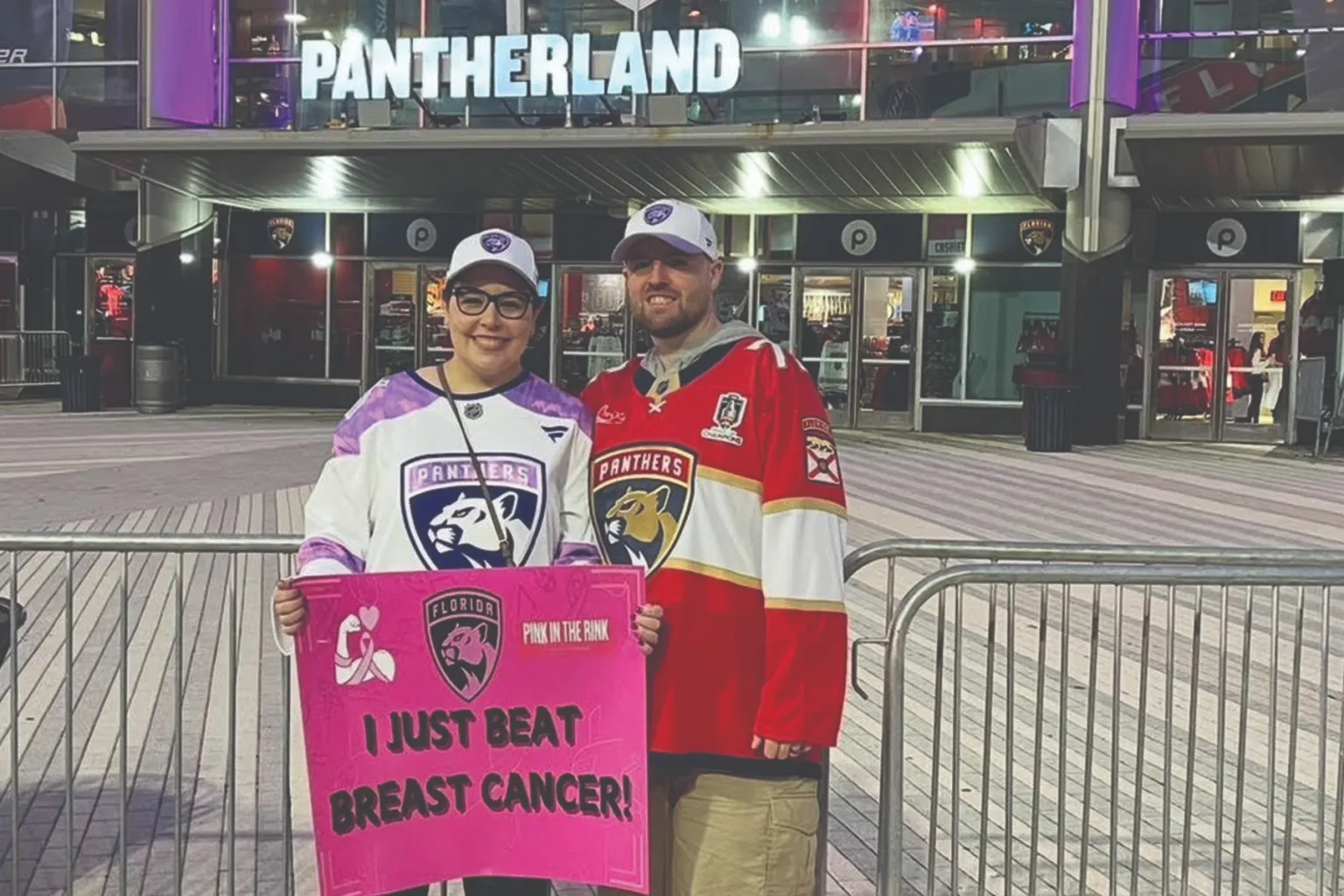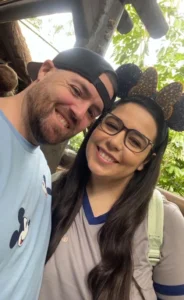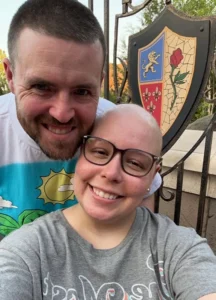Tips for Families to Cope and Flourish Amidst Cancer

A cancer diagnosis alters your life significantly, affecting you and your family from diagnosis to survivorship. Families must adapt to daily changes and strive to maintain harmony.

One young couple recounts how they continue to overcome the struggles they face in cancer survivorship.
After attending law school in Miami, Carolina Nuche moved to Boston to pursue a master’s degree at Boston University where she met Ken Bakken.
“He was the first person I connected with, and we hit it off right away,” Nuche says. “We knew early on that this was something special.”
Not long after Nuche’s graduation, she was offered her dream job at a firm in Miami. The two relocated to Florida, got engaged, and soon married. Like many other young married couples, they spent the next few years making plans for the future.
In December 2023, Nuche noticed something different on her body. She regularly performed breast self-exams and felt a lump in one of her breasts.
Nuche was diagnosed with triple-negative breast cancer, an aggressive form of the disease.
“I looked at Ken and thought, ‘He doesn’t deserve this,’ especially after the year we had previously,” Nuche says.
In the prior year, Nuche had undergone two back surgeries and was given an autoimmune disease diagnosis. Now, there were facing the uncertainty of her cancer journey. “No one wants this for their partner,” she says.
Survivors want the best not only for themselves but for their families. These kinds of thoughts, albeit intrusive, created opportunities for growth. It takes a willingness to dive into the everyday struggles of survivorship and come out with a fresh perspective.

“The personal and emotional changes for the survivor during and after treatment can feel isolating from your family — the people you love most and are fighting for,” says Joycelyn Lee, Ph.D., MBA, an oncology psychologist at Sylvester Comprehensive Cancer Center, part of the University of Miami Health System.
“Communication is huge. I encourage families to talk through things and be open, but also have an appropriate outlet to let it out through adaptive coping, like exercise, journaling and problem-solving with your therapist.”
The couple set out to manage life with the tools they had, while Nuche also sought the professional help of Dr. Lee.
“Ken and I talk about everything, even if it’s talking about difficult thoughts or emotions,” Nuche says. “We want to make sure that we process this experience and come out stronger.”
“Things are constantly changing,” Bakken says. “You have to go from one issue to another, so you have to be agile and adjust.”
He touched on a finer point in the cancer survivorship journey: resiliency.
“The idea of resiliency is an important one, but it can take time and work to find that strength as a family,” says Dr. Lee, who is an assistant professor in the Department of Psychiatry and Behavioral Sciences at the University of Miami Miller School of Medicine. “Cancer can bring families together in meaningful ways and fortify relationships within it. Unfortunately, it can also highlight some of the struggles. Some of that has to do with each person’s coping styles.”
A person’s background and past experiences greatly impact their coping style.
Some examples of unhealthy coping strategies include:
- Avoidance
- Venting
- Self-blame
- Hostility
- Isolation
- Substance abuse
Healthy coping strategies include:
- Exercise
- Mindfulness
- Self-care
- Seeking social support
- Positive thinking
Dr. Lee says that if there was strain in family relationships before, it was likely magnified after a diagnosis because of the major stress and disruption.
“If you’re someone who leans on adaptive methods, like problem solving or stress management, this is the opportunity to lean in and use them,” she says. “Those who lean toward maladaptive coping must be aware of the risks and be mindful to get support when you need it.”
Open communication was critical to their relationship as they navigated cancer survivorship.
“When you’re communicating, don’t judge what the other person is saying. It’s not an indication of what they feel about you,” Nuche says. “Everyone has negative intrusive thoughts in this experience because it affects your life in so many different ways. If you judge those thoughts and emotions, that’s when those barriers come up.”
In fact, research has found that families who were able to act openly, express feelings directly and solve problems effectively had lower levels of depression. Direct communication within the family was associated with lower levels of anxiety.
Navigating difficult times using healthy coping strategies involves maintaining honesty with yourself and your loved ones.
Dr. Lee’s tips for families
Dr. Lee emphasizes finding meaning in each day, no matter how small. Enjoy your morning coffee, connect with a friend, or read that book sitting in your to-read pile, she says.
“Thriving means living a full and meaningful life, no matter the circumstances,” Dr. Lee says.
Seek support
In tough situations, many people keep their heads down and push through. But a strong support network helps them feel whole.
“This might be an opportunity to do something different and get more from it than you could ever have imagined,” Dr. Lee says.
Also, she says, don’t be afraid to ask for help.
Support groups are a great resource, and Sylvester offers many, including groups for survivors and caregivers.
For Nuche and Bakken, a group of triple-negative breast cancer survivors online has become one of their most invaluable resources. As new developments in medications and treatments emerge, firsthand information from other survivors provides you with more confidence.
Take care of yourself
When survivors exercise regularly, eat well, and get proper rest, research shows their quality of life improves.
Dr. Lee gives the same advice to caregivers.
“Sometimes a caregiver takes on more responsibilities and loses sight of their own basic wellness needs,” she says. “It’s about finding balance to have a reservoir to offer support to the person with cancer.”
Cancer Survivorship and Supportive Care at Sylvester offers a variety of virtual and in-person wellness programs, including music and art therapy, yoga, diet and nutrition services, and more. Sessions are free and open to all — survivors and family members.
Almost two years after Nuche’s diagnosis, her treatment is behind her.

The couple still faces challenges but focuses on enjoying life on their terms — attending Florida Panthers hockey games, visiting Disney World and learning to laugh through it all.
“Despite all of the obstacles, we’re moving forward,” Bakken says. “There are obviously bad days and triggers, but it’s about taking control of our lives. We’re not letting cancer dictate where we can go. We still have many years ahead, so we communicate and reflect on the positives. Our relationship is the strongest it’s ever been, and I’m excited for what’s to come.”
The two are planning a vow renewal ceremony at Disney World this October and looking to expand their family through adoption.
Visit the Cancer Survivorship and Supportive Care website or call (305) 243-4129 for more information.
Written by Cara Tremols for SSylvester Comprehensive Cancer Center.
Tags: cancer care in Miami, Cancer survivors, couples and cancer, patient story, survivorship program, Sylvester Comprehensive Cancer Center
